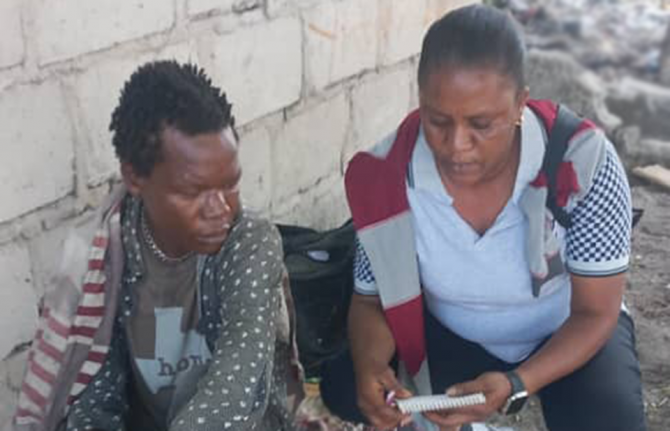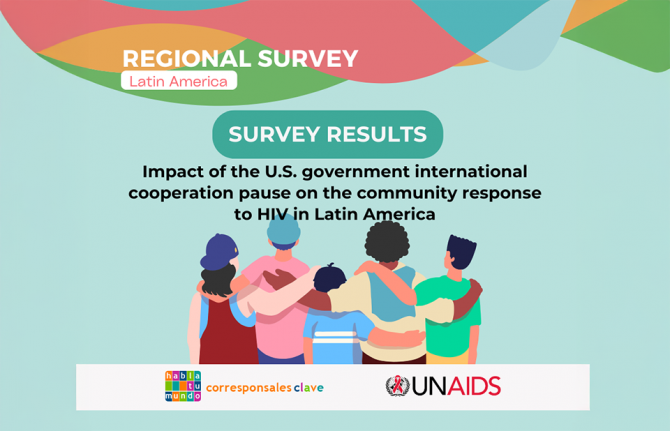
Feature Story
Cricket star Sangakkara tells Sri Lankan young people to be aware, open and informed about HIV
16 March 2011
16 March 2011 16 March 2011
Sri Lanka captain Kumar Sangakkara (second from left) joins the youth drama group during their play on the impact of stigma and discrimination for those living with HIV.
Sri Lankan cricket captain Kumar Sangakkara took time off the pitch during the Cricket World Cup tournament to speak to hundreds of young people about the importance of being informed and responsible about HIV. The event was part of the International Cricket Council (ICC), UNAIDS and UNICEF’s Think Wise campaign for the ICC Cricket World Cup 2011.
“You need to educate yourself and become more aware of the world around you and HIV. Be unafraid and unashamed to speak openly about these subjects with your friends, family and your teachers in school,” said Mr Sangakkara, during the event which was held at his old school, Trinity College, in the city of Kandy.
As part of the event, a youth drama group staged a play to demonstrate the impact of stigma and discrimination for people living with HIV. The drama reinforced the need for more education and life skills to prevent the spread of HIV, particularly among adolescents.
You need to educate yourself and become more aware of the world around you and HIV. Be unafraid and unashamed to speak openly about these subjects with your friends, family and your teachers in school.
Captain of the Sri Lankan cricket team and Think Wise champion Kumar Sangakkara
"To use theatre and cricket together was a great idea. No one expected Kumar to be a part of the play and when he came on with us, people really listened. Everything we were saying was reinforced by his presence and in his own words," said Kapila Rasnayaka, one of the young people involved in the drama group.
Kumar Sangakkara, along with other leading international cricketers including Graeme Smith (South Africa) and Virender Sehwag (India), is a ‘Champion’ spokesperson for the joint Think Wise partnership. In Kandy he was joined by Sri Lanka team mates Ajantha Mendis and Upul Tharanga who also showed their support for HIV prevention efforts in the country.
“If we are going to ‘get to zero’ on HIV, we need the active engagement of young people—the leaders of tomorrow’s response—now,” said UNAIDS Country Coordinator for Sri Lanka, David Bridger. “Sangakkara’s involvement in the campaign has helped push the boundaries, inciting discussion and a buzz around HIV that we will build on with the hope that young people will take the HIV response into their hands,” he said.
More than 7 000 people worldwide are newly infected with HIV each day—one out of three is a young person between 15 and 24 years-old. The Think Wise campaign encourages young people to be informed, take appropriate action to prevent HIV infection and stand together against the stigma and discrimination often facing people living with HIV.
External links

Feature Story
Zimbabwe: an HIV prevention success story
15 March 2011
15 March 2011 15 March 2011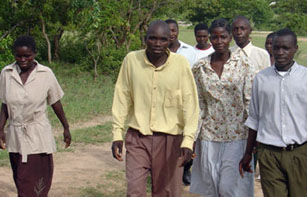
The reduction in multiple sexual partnerships major significant cause of the decline in HIV prevalence in Zimbabwe.
HIV prevalence in Zimbabwe has declined remarkably in recent years, dropping from 26% to 14% between 1997 and 2009. In a recent edition of the journal PLoS Medicine, researchers explored the reasons for this decline and examined what lessons can be learned and replicated.
Sponsored by UNFPA, UNAIDS and the Zimbabwean Ministry of Health and Child Welfare, the study pinpointed several key factors in Zimbabwe’s success. These include changes in sexual behaviour, personal experiences related to the high AIDS mortality in the country and correct information about HIV transmission.
“The behaviour changes associated with the HIV decline appear to be largely the result of people increasingly talking about HIV and its link to risky sexual behaviour,” said Clemens Benedikt, HIV prevention manager in the UNFPA office in Zimbabwe and one of the authors of the report.
The most significant cause of the decline was seen to be the reduction in multiple sexual partnerships, with a 30% fall in men reporting extra-marital relationships. This can be partly attributed to the success of HIV prevention programmes, both mass media and those based on inter-personal communication through the church, work-place, friends and family. Such programmes stressed the protective effect of having fewer partners and promoted condom use during casual sex.
According to the study, there have been a number of significant shifts in sexual norms. For example, in previous years, men gathering in beer halls and bottle stores tended to be surrounded by women, some of whom were sex workers. Now, it is more typical for such places to be men only.
The entrenched economic crisis has also played a role. Men reported having less money to spend on sustaining multiple partnerships as well as using the services of sex workers. However, this is noted as a secondary factor given that the most severe effects of the financial crisis were felt after 2002 when most of the decline in HIV incidence had already happened.
Zimbabwe provides a clear example of the profoundly positive results that behaviour change can bring about in an effective AIDS response
Bruce Campbell, co-author of the report and currently UNFPA Representative in Viet Nam
Another apparent spur in behaviour change was high AIDS mortality. AIDS-related deaths increased significantly during the mid- to late-nineties and stabilized after 2000. Many women and men in the authors’ focus groups reported that knowing people who had died as a result of AIDS was a large motivating factor to modify their own sexual behaviour. According to the study, the policy of home-based care for people living with HIV adopted in Zimbabwe may have also contributed to this phenomenon as people were brought face-to-face with the reality of AIDS in their own homes.
“Zimbabwe provides a clear example of the profoundly positive results that behaviour change can bring about in an effective AIDS response,” said Bruce Campbell, co-author of the report and currently UNFPA Representative in Viet Nam. “People can and do look at their individual and collective circumstances and make informed decisions about how to protect themselves and others, especially in an environment where information and education interventions highlight the link between sexual risk behaviour and HIV.”
The authors also argue that Zimbabwe's experience highlights the importance of prevention in an effective and sustained response to HIV, despite the growing availability of antiretroviral drugs. According to UNAIDS, globally there are still two new HIV infections for every one person starting treatment and prevention efforts make up only around 20% of AIDS-related spending in low- and middle-income countries.
Similar to the Zimbabwean example, HIV prevention success has been achieved in a number of countries in sub-Saharan Africa. According to the latest UNAIDS report on the global epidemic, some 22 countries have reduced the rate of new infections by more than 25% between 2001 and 2009. These include several other countries with the region’s highest prevalence, including South Africa and Zambia. And in many cases, it is young people who are leading the ‘prevention revolution ‘and changing their behaviour by deciding to delay sex, having fewer partners and using condoms.
External links
External links
Related

Feature Story
Addressing stigma and discrimination and homophobia key to achieving universal access in Latin America
15 March 2011
15 March 2011 15 March 2011
More than 90 delegates participated in the Latin America consultation to review progress made towards achieving universal access to HIV prevention, treatment, care and support. Mexico City, 2-3 March 2011.
The Secretary of Health of Mexico, Dr José A. Córdova, called on countries in Latin America to continue efforts to counter stigma, discrimination and homophobia in the region.
Dr Córdova was one of seven Ministers and Vice Ministers of Health among more than 90 delegates contributing to the review of progress made towards achieving universal access in the AIDS response. The consultation, held in Mexico City from 2-3 March 2011, made regional recommendations and developed a roadmap on how to achieve universal access to HIV prevention, treatment, care and support by 2015.
“We need to strengthen the human rights approach in our response to AIDS and establish mechanisms to ensure that both public and private services are free of stigma and discrimination or homophobia,” said Dr Córdova.
Persistent homophobia, gender-based violence, persecution and even killings of most-at-risk populations such as men who have sex with men (MSM) and transgender people were identified as some of the main obstacles to ensuring access to HIV-related services in the region. Strengthening health systems that do not discriminate people living with HIV and key populations at higher risk of infection was seen by participants as a priority to achieve universal access. Improving access to legal services for human rights violations, discrimination and gender-based violence was also highlighted.
We need to strengthen the human rights approach in our response to AIDS and establish mechanisms to ensure that both public and private services are free of stigma and discrimination or homophobia
Secretary of Health of Mexico, Dr José A. Córdova
The AIDS epidemic in the region has remained stable for the last 10 years with an HIV prevalence of 0.5%. Antiretroviral therapy coverage is at 51%, which represents the highest in the world. However, young people, sex workers, MSM, and transgender people still have limited access to sexual and reproductive health programmes that provide information, skills, services and commodities to prevent HIV infection.
“We can only improve HIV prevention for the transgender community in Latin America through the respect for their identity in the health services,” said Marcela Romero from REDTRANSLAC, Argentina.
Participants identified a need to strategically position HIV within broader political agendas—including education, justice, equality, labour, and social development. This, it was felt, would secure political commitment and financial sustainability. According to the participants, investment from different sectors would have a multiplier effect that will contribute not only to achieve universal access goals but support the achievement of the broader Millennium Development Goals.
The need to strengthen relations between governments, civil society organizations and networks of people living with HIV throughout the region was another recommendation from the meeting. It was also proposed to jointly purchase antiretroviral drugs for the region rather than as individual countries to achieve economies of scale and to increase HIV treatment coverage. Additional strategies included enhancing production of locally produced antiretroviral drugs.
“Working together we can ensure a unified regional response to the epidemic and set the path towards sustainability in Latin America,” said UNAIDS Regional Director Dr César Núñez.

Feature Story
amfAR briefing highlights roadmap to accelerating an HIV prevention revolution
11 March 2011
11 March 2011 11 March 2011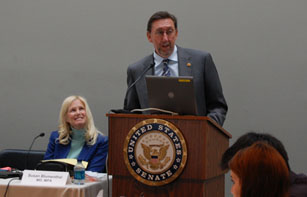
UNAIDS Deputy Executive Director Paul De Lay speaking at the briefing organised by amfAR entitled "Accelerating an HIV Prevention Revolution: A Roadmap".
Credit: amfAR
As part of amfAR’s emerging issues series, a briefing was held on Capitol Hill, in Washington, D.C. on 9 March entitled "Accelerating an HIV Prevention Revolution: A Roadmap". Speaking at the briefing, UNAIDS Deputy Executive Director Paul De Lay stressed the need to scale up combination HIV prevention worldwide.
“Bringing one or two interventions to scale will not suffice to curb the spread of HIV. Rather, we must urgently work to bring multiple prevention strategies to scale simultaneously,” said Dr De Lay. “Like combination antiretroviral therapy, complementary HIV prevention strategies work synergistically when they are combined in a strategic way,” he added.
The briefing highlighted emerging scientific advances in HIV prevention research, innovative community models, opportunities for scaling up prevention programmes, and domestic and global policy implications.
Other panelists at the briefing included Willard Cates, Family Health International, who gave an overview of HIV prevention technologies; Robert Remien, Columbia University, who spoke on behaviour change prevention strategies; and Carl Dieffenbach, Division of AIDS at the National Institutes of Health, who discussed innovative community models for HIV prevention.
Since its inception in 1985, amfAR has invested nearly $325 million into AIDS research and has awarded grants to more than 2 000 research teams worldwide.
Read more on the amfAR event

Feature Story
Women under the Same Sky
10 March 2011
10 March 2011 10 March 2011
High profile women wearing the Same Sky bracelets.
Credit: Same Sky
“Our project offers a hand up, not a hand out,” says Francine Le Frak, founder of Same Sky, a “trade-not-aid” initiative that markets high-end artisan bracelets produced by women’s cooperatives in Rwanda for the North American market.
Ms Le Frak, a film producer from the USA and now social entrepreneur, started Same Sky while trying to make a film about the genocide in Rwanda. Although the film project never materialized, she felt there were other skill sets she could lend to make a difference in the lives of the women she met in the country.
“I wanted to help the women who were still truly devastated by the genocide 15 years later,” Le Frak says. “I decided to work with women living with HIV. I found that they were forgotten, and [they] just couldn’t seem to get back into the swing of life.”
Today, an estimated 88 000 women living are with HIV in the country. Many women report having faced sexual violence in their lifetime.
We want to give the women the opportunity to sell their products. You can train all day but if you don’t give them the opportunity of employment, what are you accomplishing?
Francine Le Frak, founder of Same Sky
Same Sky works with a local organization in Rwanda called Gahaya Links Handicraft Center, based in the capital Kigali. Gahaya Links was founded by two sisters: Joy Ndunguste and Janet Nkubana, and their company was incorporated in 2004 as the first handicrafts export company.
Based on the principle of women’s economic empowerment through fair trade, Gahaya Links supports women’s cooperatives as a way to give women a source of sustainable income.

Francine LeFrak with Same Sky artisans and Joy Ndungetse, Founder of Gahaya Links Handicraft Center in Kigali, Rwanda. Credit: Same Sky
“We help women acquire skills that they can use to make an income, and Francine has given them access to a market to sell their products,” says Joy Ndungetse, co-founder of Gahaya Links. “You can now see the joy of living on their faces.”
“I’m a good marketer,” says Le Frak. “We want to give the women the opportunity to sell their products. You can train all day but if you don’t give them the opportunity of employment, what are you accomplishing?” Le Frak asks.
Related

Feature Story
Hitting HIV for six: Star cricketers unite with people living with HIV in India
10 March 2011
10 March 2011 10 March 2011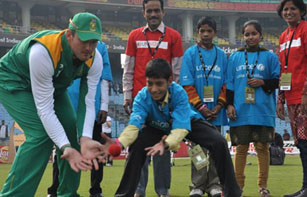
Captain of the South African cricket team and Think Wise champion Graeme Smith and a young participant take a catch at the training session organized with people living with HIV.
Sonu Kumar grips the cricket ball in his hand, takes his run up and bowls a fast ball. Reacting quickly, his opponent angles his bat and smashes the ball out of the ground for six.
But this is no ordinary cricket match. Sonu is a 14 year-old living with HIV, knocking around balls with cricketing great Graeme Smith and his colleagues from the South African team. The occasion, a special HIV awareness-raising practice session organized as part of the International Cricket Council, UNAIDS and UNICEF Think Wise campaign during the 2011 Cricket World Cup.
The Think Wise campaign encourages young people to learn how to prevent HIV infection and stand up against stigma and discrimination. At the Feroz Shah Kotla Stadium in Delhi, Graeme Smith—South African Captain and official ambassador for the Think Wise campaign— and teammates took time out of their match schedules to promote the campaign messages.
“We play sport and love cricket, like so many others in this country. By training together the cricketers are showing their support for people living with HIV and help break down discrimination we often face,” said Sonu.
In the presence of supporters and media, a group of ten young people joined the elite cricketers, mixing training with talking about HIV. They participated in drills on the field with Richard Pybus, coach of the South African cricket team. Later the young people discussed their experience living with HIV with the team, asking questions about the role of cricketers in addressing issues of HIV related stigma.
The key for us is to educate people during the tournament—to help prevent HIV and to show that people living with HIV lead normal lives. I believe this will contribute in reducing stigma.
Graeme Smith, captain of the South African cricket team and Think Wise champion.
“HIV is a very real disease and has affected people all around the world including in our country and here in India,” said Mr Smith during the practice session. “The key for us is to educate people during the tournament—to help prevent HIV and to show that people living with HIV lead normal lives. I believe this will contribute in reducing stigma,” he said.
Underlining the broad reach of cricket in India and across the world, UNAIDS Country Coordinator Charles Gilks said, “Cricket has a huge following in India and cricket stars can be very powerful agents for change. We are particularly pleased to link up with Think Wise champions as we aim for the UNAIDS’ hat-trick of zero new infections, zero discrimination and zero AIDS-related deaths.”
Hospital gets Sehwag treatment
In another Think Wise activity taking place in India, Think wise champion and India’s opening batsman Virender Sehwag called on cricket fans across the world to stop discrimination against people living with HIV.
Mr Sehwag made his plea after visiting the Haji Sir Ismail Sait Ghosha hospital in Bengaluru where he met people whose lives have been affected by HIV.
“People living with HIV are no different from anybody else. There needs to be more awareness of what it means to be living with HIV,” said Mr Sehwag. “As cricketers, particularly in a country like India, we are in a position to help influence attitudes and behaviour and by being involved in the Think Wise campaign hopefully I can play my part,” he said.

Feature Story
National ownership of the AIDS response essential for universal access in West and Central Africa
07 March 2011
07 March 2011 07 March 2011
(L to R): Dr Toure, Coordinator for WHO’s inter-country team for West Africa, Hedia Belhadj, UNAIDS Director of Partnerships, Mr Jean Tchoffo, Permanent Secretary for the Ministry of Finance, Cameroon, Dr Meskerem Grunitzky-Bekele, Director of the UNAIDS Regional Support Team for West and Central Africa, Dr Sabine Ntakirutimana, Minister of Health and the Response to HIV, Dr Marie Ahouanto, French Cooperation, Bureau des politiques de Santé et de la Protection Sociale, Dr.Manuel Rodrigues Boal, Conseiller du Ministre de la Santém, Cap Vert, Yamina Chakkar, UNAIDS regional support adviser, Macoura Oulare, UNICEF Senior HIV Specialist, Leiliane Corcher M’boa, Secrétaire Exécutive, RAP+ Afrique de l’Ouest
Stakeholders in the AIDS response across West and Central Africa met in Dakar, Senegal from 3–4 March 2011 to review progress made towards achieving universal access to HIV prevention, treatment, care and support. The regional consultation was organized by UNAIDS in collaboration with its Cosponsors, regional civil society networks, government representatives and development partners.
Dr Modou Diagne Fada, Minister of Health and Prevention of Senegal stressed the importance of national ownership, “Leadership and national ownership of the AIDS response will accelerate our action towards achieving universal access and the Millennium Development Goals.”
Participants acknowledged that there has been progress on scaling up towards universal access to HIV prevention, treatment, care and support in the region. Access to antiretroviral treatment has increased from 1% in 2001 to 25% in 2010. There has also been an increase in coverage of prevention of mother-to-child transmission services from 4% in 2005 to 23% in 2010. Most noticeably, the HIV incidence has dropped in ten countries and HIV prevalence has been stable in seven.
The consultation also identified existing implementation gaps in order to achieve the MDGs by 2015. One example discussed was the strong dependence on external financing for HIV and Health programmes. “Advocacy for increased sustainable financing of national AIDS programmes should be evidence based and strongly linked to countries’ development agendas in order to achieve the MDGs,” said Mr Jean Tchoffo, Permanent Secretary for the Ministry of Finance of Cameroon.
Leadership and national ownership of the AIDS response will accelerate our action towards achieving universal access and the Millennium Development Goals.
Dr Modou Diagne Fada, Minister of Health and Prevention of Senegal
Another gap identified was the weak linkages of the HIV response with other health services. The Minister of Health from Burundi, Dr Sabine Ntakirutimana, highlighted the need for an enhanced integration with health services in order to achieve universal access and in particular the virtual elimination of mother-to-child transmission of HIV. “HIV should be used as an entry point to more integrated delivery of health services,” added Dr Ntakirutimana.
Political and social instability in most countries of the region, which aggravates the lack of institutional frameworks related to an effective response to HIV, was also raised by participants as a major obstacle. “In a region where more than 50% of States are either in conflict or post conflict situations it is imperative that the humanitarian response addresses the needs of people living with HIV,” said Dr Meskerem Grunitzky-Bekele, Director of the UNAIDS Regional Support Team for West and Central Africa.
Participants discussed the case of the post-electoral crisis in Ivory Coast and the ensuing instability threatening access to treatment for people living with HIV in the country. With increasing poverty levels and an HIV prevalence rate of 4.7%, the health sector in the Ivory Coast is directly affected by the current economic sanctions. Participants agreed that there is an urgent need to proactively respond to the issue, working with responsible actors to ensure access to HIV treatment is not interrupted.
According to the participants, other gaps hampering progress towards achieving universal access in the region were the inadequate allocation of resources towards the main modes of HIV transmission as well as lack of good governance and mechanisms for accountability. Stigma and discrimination and weak health systems are limiting the supply of services for HIV prevention, treatment and care.
At the end of the meeting, recommendations for enhanced national ownership to achieve universal access in the region were developed and key priorities agreed. These include: strengthening leadership; optimization of domestic and external resources; improving access to treatment; revitalization of HIV prevention; the involvement of young people as agents of change; and the promotion of human rights, gender and social equity in national AIDS plans.
Inputs from a pre-Civil Society Consultation, held on 28 February and a National Ownership Meeting on 1–2 March which also took place in Dakar were also taken into account during the consultation.

Feature Story
New book sheds light on women and men’s access to care and experience of care-giving in African countries
07 March 2011
07 March 2011 07 March 2011
A new book publishes research that sheds fresh light on the lives of women living with HIV in African countries and their experience as recipients and givers of care.
Ahead of International Women’s Day 2011, the French national agency for AIDS and viral hepatitis research (ANRS), launched Les Femmes à l’épreuve du VIH dans les pays du Sud: genre et accès universel à la prise en charge (Women and HIV in the south: Gender and universal access to care).
It gathers the works of over 15 researchers and explores different aspects of HIV care including equality of access to care, the experience of men and women within health care systems and the significant role of women in the management of infection within the family.
While women living with HIV appear to have better access to health care and other services than men living with HIV, the analysis highlights that their specific needs and experiences, including as mothers, are not sufficiently addressed within HIV programmes.
Women also remain poorly supported in specific areas such as access to contraception and medical care for HIV-related women-specific pathologies. Also burden of care management within families affected by HIV all too often relies wholly on women.
The book also challenges the view of vulnerability traditionally ascribed to exclusively affecting women. Rather, the researchers posit, men are also subject to forms of social vulnerability that limit or delay their access to HIV testing and counselling and care.
Professor Jean-François Delfraissy (Director of the ANRS), Professor Françoise Barré-Sinoussi (2008 Nobel Prize in Medicine, Pasteur Institute Paris) and Mr Michel Sidibé, Executive Director of UNAIDS, have written the preface to the publication.
Published in the ANRS collection “science sociales et Sida”, the book is edited by Alice Desclaux (Aix-Marseille Paul Cézanne University, IRD UMI 233 and Centre for Research and Training in clinical management, Dakar), Philippe Msellati (IRD UMI 233, Yaoundé, Cameroon) and Khoudia Sow (Aix-Marseille Paul Cézanne University, IRD UMI 233, and Regional Centre for Research and Training in clinical management, Dakar).
The book was launched at ANRS in Dakar on 7 March, the eve of International Women’s Day 2011, during a meeting co-organized by the ANRS, UNAIDS and the IRD (the French Research Institute for Development in southern countries). Over 100 participants took part in this meeting, including researchers, representatives of international institutions, health authorities and civil society. ANRS in Cameroon and Burkina Faso also launched the book on the same day.

Feature Story
UNHCR: Countering stigma and silence about HIV among refugees and host communities in northern Ecuador
04 March 2011
04 March 2011 04 March 2011A version of this story was first published at UNHCR.org

Lucilda, a young mother of two, recently discovered that her husband had infected her with HIV. He recently died and the Colombian refugee finds herself alone in an area where people living with HIV are stigmatized.
Credit: UNAIDS/V. Rodas
Ten years ago, a teenager called Lucilda* ran away from her home in Colombia because she feared her mother's rage after going to a party without permission. At the age of 25 she got married and fled to Ecuador with her husband to escape the conflict in southern Colombia's Putumayo department. Her husband was violent to her and unfaithful. He has since died of an AIDS-related illness and Lucilda is struggling to raise two children alone as a refugee in Ecuador.
"He was very ill, but he didn't want to go to see a doctor. I took him and they told us what was going on. They also said that I was infected," she added. "He knew that he had AIDS, but he never told me."
Lucilda is receiving antiretroviral treatment and both her children are HIV negative. She is one of a small, but growing, number of people living with HIV in northern Ecuador's Sucumbios province and its capital, Lago Agrio, where some 20% of the population of 60,000 are Colombian refugees. At least 30 people here were known to be living with HIV as of the end of last year, double the number for 2009.
"This figure is certainly just the tip of the iceberg with regard to the number of people who are infected with HIV," said Paul Speigel, head of UNHCR's Geneva-based Public Health and HIV Section.
But the lack of openness about HIV is difficult to tackle in a conservative, male-dominated society, where those living with HIV, especially women, face stigmatization. With understanding key to preventing new infections, UNHCR and its partners are trying to counter this mindset and to spread awareness about the virus.
I didn't want him to touch me, but he took a knife and forced me
Lucilda,* a woman living with HIV who is a refugee in Ecuador
A special UNHCR programme to prevent HIV has been implemented by community health workers, and is helping to educate refugees and host communities in isolated areas of the jungle surrounding Lago Agrio. They also give lessons on sexual health, family planning and general health services, explaining the importance of safe sex and ensuring that people have the knowledge and freedom to keep themselves safe from HIV. Tackling gender-based violence is also a major concern in attempts to halt the spread of HIV.
Lucilda has firsthand experience of such violence. When she found out that her husband had been having sex with other women his reaction was harsh.
"I didn't want him to touch me, but he took a knife and forced me," she recalled. "I felt as if I had been raped."
The new UNAIDS strategy 2011-15, promotes zero tolerance of gender-based violence and discrimination. It recognizes that such violence is a human rights violation. It can also hamper people’s ability to adequately protect themselves from HIV infection and make healthy decisions about how, when and with whom they have sex. To successfully challenge the AIDS epidemic it is seen to be of paramount importance that Lucilda and other women live their lives free from the threat of violence.
*Name has been changed to protect her identity

Feature Story
Bangladesh gives the 2011 Cricket World Cup an HIV awareness spin
03 March 2011
03 March 2011 03 March 2011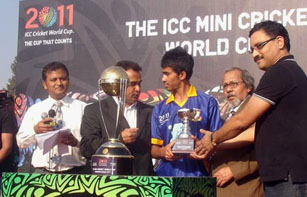
Participants of the ‘Mini Cricket World Cup’ schools tournament are presented with awards in Bangladesh
As the overs are bowled, the wickets fall and the crowds go crazy in the 2011 Cricket World Cup, host-country Bangladesh is giving the tournament an HIV spin. Through the Think Wise campaign the tournament is raising awareness among young people on HIV prevention and reducing stigma.
The Think Wise campaign, led by the International Cricket Council (ICC) in partnership with UNAIDS and UNICEF, harnesses the power of cricket to prevent HIV. Together with co- host countries—India and Sri Lanka—Bangladesh is organizing a number of “Think Wise” activities throughout the World Cup tournament that runs from 19 February – 2 April.
One such activity was the Schools Programme event where the World Cup was used as a platform to promote the sport, as well as to share information on HIV. Sixty of the country’s schools participated in the orientation which included the lively presence of “Stumpy the elephant”, the official mascot of the ICC event.
“I really appreciate this initiative! We don’t get to know this information about HIV usually and my perception about AIDS has changed,” said one of the young participants. A selection of the schools then took part in a ‘mini world cup’ cricket tournament, where HIV messages were shared with players and supporters through video, information and education materials in English and Bangla. “I’m now educated about HIV by coming here! It’s a great initiative for young people,” said one of the young men visiting the special UNAIDS booth.
Through the Think Wise campaign we have established important relationships with the Bangladesh Cricket Board, business partners, the media and we have sparked the interest and passion of young people
Salil Panakadan, UNAIDS Country Coordinator for Bangladesh
The Bangladesh campaign received a high-profile boost from an announcement of the country’s team captain Sakib Al Hasan. “As Think Wise Champion, I’m happy to use my current popularity to raise awareness on AIDS,” said Mr Hasan at a press conference announcing his role. “We [cricketers] want to leave behind a legacy of social awareness of AIDS so young people will get to know more about HIV.”
“The involvement of cricketing heroes helps raise the profile among young people—and all cricketing fans,” said UNAIDS Country Coordinator for Bangladesh, Salil Panakadan. “Through the Think Wise campaign we have established important relationships with the Bangladesh Cricket Board, business partners, the media and we have sparked the interest and passion of young people. This gives us a tremendous opportunity to build on even after the last tournament over is bowled,” Dr Panakadan added.
A host of additional activities will take place in Bangladesh, India and Sri Lanka as the tournament continues including site visits and interaction between star players and key affected communities. Cricket teams will wear red ribbons on their shirts in key matches and HIV prevention messages will be promoted at venues on all match days.











